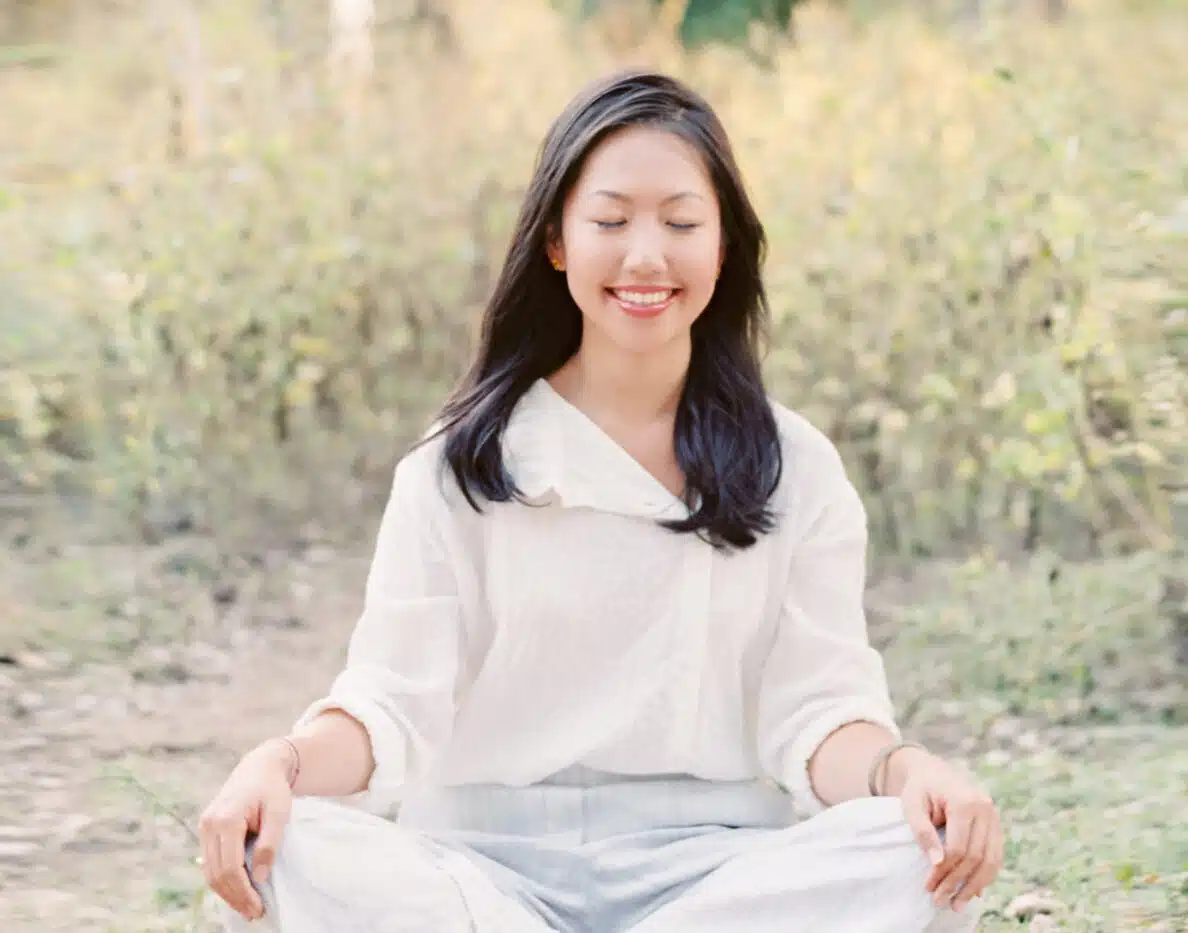Meditation and Stress Management: Techniques for Finding Balance in a Busy World
In the relentless hustle and bustle of modern life, stress has become an unwelcome companion for many. In a recent 2022 study on the impacts of stress on Americans, over 50% of Americans say that they feel some level of stress on a daily basis.
27% of all adults say that on most days they are so stressed, they can’t function.

Stress is impacting younger adults, of whom over 51-62% feel they are completely overwhelmed by stress.

Start your Meditation Journey Today
ATTEND A FREE INTRO TALK
As a meditation teacher, when I see these stats, the first thing that comes to mind is, “This is the world we need to change.” With 1 in 4 adults feeling incapacitated by their stress, and 2 in 3 young adults feeling overwhelmed, stress is an epidemic of our time.
I teach a technique of meditation that is the most impactful in its ability to eliminate and eradicate stress from the body. I’ve seen many stressed individuals come through my program, and feel at ease and rested by the end of the 4-Day course.
Interestingly, it’s not only the meditation course that helps open the doorway to the release of stress and return to finding balance.
In fact, there is one domino that needs to fall first for the meditation to really have its full effect – and that’s understanding stress and debunking some myths about it.
Let’s dive into the understanding of what stress is and isn’t, and then we’ll discuss t how meditation for stress management can help.
Demystifying Stress: It’s Not Out There, It’s In Here
One of the most pervasive misconceptions in modern society is the idea that stress is a tangible, external entity—a person, place, or thing. We often hear phrases like “The person is so stressed,” “My job is so stressful,” or “New York City is a stressful environment.”
However, it’s essential to clarify that stress is not a characteristic of people, jobs, or locations. Stress is not an inherent quality or a personality trait. Instead, it’s an internal, physiological response that originates within us.
Stress is not an objective feature of our surroundings but rather a subjective reaction we experience. While certain jobs or environments may indeed be high demand and filled with stimuli, stress does not reside in these external factors themselves. It resides in our individual responses to them.
Understanding this distinction is crucial because it empowers us to take control of our stress responses. Stress is not something imposed upon us; it’s a reaction we generate within ourselves. By recognizing that stress is not a person, place, or thing, but a product of our internal processes, we can develop strategies to manage and mitigate its effects.

What is Stress, Then?
Stress, as defined by Professor Hans Selye, also known as “the Father of Stress,” is a physiological response (i.e. a reaction that our bodies have) to demands or changes in our expectations. It’s part of the general adaptation syndrome (GAS), which involves our ability to either successfully adapt or fail to adapt to these demands. How we respond to stress is influenced by various factors, including our current state of rest, overall health, age, genetic predispositions, and more.
When we encounter a demand or change in expectation, our body and mind assess whether we have enough “adaptation energy” to respond effectively. If we do, we adapt successfully. If not, we may experience a stress reaction.
This reaction, often referred to as the fight or flight response, is an automatic, involuntary mechanism designed to protect us from perceived danger. It involves physiological changes such as narrowing of peripheral vision, skin pH changes, and the release of stress hormones.
Professor Selye had a famous quote that said, “There are no inherently stressful situations; there are only stressful reactions to given situations.”
What is Chronic Stress?
Chronic stress is an ongoing, long-term state of stress that occurs when our bodies continuously react to various demands or changes in our expectations. Unlike acute stress, which is a short-term reaction to immediate challenges, chronic stress can persist for weeks, months, or even years.
One key characteristic of chronic stress is the development of a “hair trigger” stress response. This means that individuals experiencing chronic stress have a heightened sensitivity to stressors. Their bodies have learned to react strongly and swiftly to even minor changes in expectation, creating a cycle where stress accumulates over time.
Chronic stress can have a detrimental impact on our health.
It can lead to a range of physical and psychological symptoms, including digestive issues, dehydration, immune system suppression, and even cardiovascular problems.
Additionally, chronic stress can result from an accumulation of what Professor Selye called “premature cognitive commitments.” These are associations our brains make between certain stimuli (like colors, smells, or sounds) and stress reactions due to past experiences.
Getting Stressed is Okay…Staying Stressed Isn’t
It’s important to understand that stress is not the boogeyman. We actually want to be thankful to the body for the stress response. It’s a normal response that has kept us safe for millions of years as a species.
However, in today’s modern lifestyle, we specialize in lifestyles of stress. Our bodies weren’t made for the constant stimuli of news, worries, demands, and social media – these all add to our stress. This constant low-grade drizzle of stress biology flowing in our body starts to have a deleterious effect of imbalance in every area of our lives.
Take, for example, the effects of stress on the immune system.
The Vicious Cycle of Stress Response for the Immune System
Stage 1: Persistent Worries and Safety Concerns
Chronic stress begins with an incessant preoccupation with worries and concerns, occupying our thoughts day and night. It’s as if our mind is trapped in a loop, continually evaluating potential threats and safety measures, leaving us mentally fatigued.
Stage 2: Relentless Fight or Flight Response
This unceasing mental preoccupation triggers our body’s fight or flight response without respite. Our system remains on high alert, flooded with stress hormones like cortisol and adrenaline, preparing us for perceived dangers that may never materialize.
Stage 3: Chaos in the Immune System – Imbalance
Over time, the prolonged activation of the stress response system takes a toll on our immune system. The once finely-tuned defense mechanism descends into chaos. The body’s ability to distinguish between genuine threats and everyday challenges weakens, leaving us more susceptible to illness.
Stage 4: Activation of “Sickness Behavior”
As our immune system weakens, the brain initiates what’s known as “sickness behavior.” This is a protective response intended to keep us rested and safe, urging us to slow down to conserve energy and recover. However, this very mechanism sets the stage for the vicious cycle to begin.
Stage 5: Low-Grade Inflammatory Reaction
Here’s where the cycle takes a dark turn. Sickness behavior, although designed to protect us, paradoxically triggers a low-grade inflammatory reaction within our bodies. This inflammation, often subtle but pervasive, sends signals back to the brain.
Stage 6: Irritability and Increased Vulnerability
The inflammatory signals feed back to the brain, causing irritability and heightened vulnerability to further stressors. Now, even minor stressors can trigger heightened reactions, perpetuating the cycle. This increased sensitivity to stressors affects our mental and physical health , making it challenging to escape the grip of chronic stress.

Finding Balance to Eliminate Stress: Debunking This Myth
For many of us, when we’re feeling the effects of stress, we seek balance in our lives in hopes that it will reduce the stress.
We may look to work less, sleep more, and improve our diet, all in hopes that it will help us feel stronger physically and mentally .
While all of these things are helpful at preventing the cycle of stress from getting even more deeply entrenched, they don’t do anything to release the massive amounts of stress, as Professor Selye calls “premature cognitive commitments,” that we’ve been accumulating since we were young.
Trying to find balance to eliminate stress is a bit like the tail wagging the dog. We need to get to the root cause of stress which is causing the imbalance in the first place.
Eliminate Stress First, Then Balance Follows
To break free from the relentless grip of accumulated stresses and premature cognitive commitments, deep bodily rest becomes the transformative key. Within this profound state of rest, stresses are released, and adaptation energy surges, ushering the body from perpetual chaos driven by stress chemistry into a harmonious equilibrium known as “stay and play.”
This shift, returning the body to homeostasis, empowers individuals to gracefully navigate the demands of high-performing lives, unburdened by chronic stress and fortified with vitality.
The result? We no longer have to “find balance” in our lives; we simply live it.
So, the question becomes…how do we find the right type of deep rest to trigger this healing from chronic stress to balance and bliss? Well, that’s where the power of meditation comes in.
Vedic Meditation: A Powerful Tool for Deep Rest
Vedic Meditation is an ancient mental technique that traces its origins back thousands of years.
Vedic Meditation is the best meditation for stress and anxiety. It excels at guiding the mind deep into layers of tranquility and stillness, resulting in a thought-free, consciously rejuvenating state.
In this profound journey, the greater the stillness of the mind, the deeper the relaxation and repose experienced by the body.
Remarkably, a 20-minute session of Vedic Meditation imparts to the body the equivalent of hundreds of minutes of sleep-equivalent rest, which paves the way for an easy and systematic release of accumulated stresses and the facilitation of healing.
This time-honored practice stands as a steadfast gateway to rejuvenation within the demands of our modern lives.
As a twice-daily Vedic Meditator, one is releasing more stress from the physiology than they can take in on any given day, which allows the negative effects of chronic stress to dissipate, and balance to come naturally.
In this way, Vedic Meditation offers us a much more powerful alternative to “stress management.” Vedic Meditation can pave the way for stress elimination altogether.
With this mindfulness-based stress reduction technique, everyone has the chance to live a life that prioritizes adaptability, resiliency, and wholeness in health, rather than constant stress management.

Vedic Meditation Course: A Deep Dive into the Science of Stress and Happiness
My personal journey of discovering the profound benefits of meditation (especially Vedic Meditation) ignited a deep curiosity within me, driving me to delve into the intricate science of stress.
This fascination forms the foundation of my teaching approach in the 4-day course. We dedicate a session to understanding the intricacies of stress, and exploring how and why it accumulates over a lifetime.
Moreover, we delve into the experiential aspect, guiding new meditators to grasp the sensation of stress release within meditation, thus providing a holistic understanding of its physiological processes.
By the end of the course, participants not only learn how to meditate but also emerge with a comprehensive knowledge of stress and the proactive measures required to eliminate it, equipping them with insights surpassing those of 95% of contemporary health practitioners.
Take the Next Step
To learn more about how Vedic Meditation not only manages your stress but eliminates them completely, join me for an Introductory Talk on Vedic Meditation.
I’ll share with you my own personal journey from feeling the effects of chronic stress to being able to live a healthy, abundant, and energetic life.






